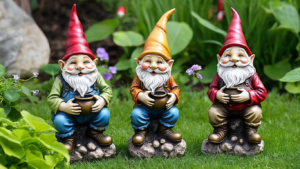
Gardening—it’s more than just a hobby for retirees or the green-thumbed among us. It’s a lifestyle, a way to connect with nature, and a fantastic source of fresh, homegrown produce. But here’s the million-dollar question: Is gardening worth it financially? Let’s dig into the dirt and uncover the truth.
The Initial Costs of Gardening
Gardening isn’t free, and setting up your green oasis requires some upfront investment.
Buying Seeds and Plants
First things first, you need seeds or plants. Depending on what you want to grow, seeds can be quite affordable, but if you’re after specific varieties or larger plants, the costs can add up quickly. Heirloom seeds and starter plants, while sometimes pricier, can be worth the investment for their unique flavors and robust growth.
Investing in Tools and Equipment
A good gardener never blames their tools, but having the right ones certainly helps. Basic tools like a shovel, rake, hoe, and watering can are essentials. If you’re serious about gardening, you might also invest in quality gloves, pruners, and even a compost bin. For those looking to get fancy, raised beds or a greenhouse can be enticing but come with higher costs.
Preparing the Garden Space
Whether you’re transforming a patch of lawn into a vegetable garden or setting up raised beds, preparing your garden space can involve significant effort and expense. You might need to buy soil, compost, mulch, and possibly hire some help for the heavy lifting.
Ongoing Expenses
Once your garden is up and running, it’s not entirely cost-free. There are several ongoing expenses to keep in mind.
Watering and Irrigation Systems
Plants need water, and depending on your local climate, this can be a major cost. Installing a drip irrigation system can save water and time, but it’s an initial investment. Alternatively, a rain barrel setup can be a cost-effective way to keep your garden hydrated.
Fertilizers and Soil Amendments
To keep your plants healthy and productive, you’ll likely need to invest in fertilizers and soil amendments. Organic compost, manure, and specialized fertilizers can help your plants thrive but can add to your gardening budget.
Pest Control and Disease Management
Nature isn’t always kind. Pests and diseases can wreak havoc on your garden, and dealing with them often requires buying specific products. Organic options can be pricier, but they’re safer for your family and the environment.
Time Investment
Gardening isn’t just a financial investment—it’s a time commitment too.
Planting and Growing Seasons
Planting seeds, transplanting seedlings, and monitoring their growth takes time. Understanding the growing seasons and the needs of your plants is crucial for a successful garden.
Daily and Weekly Maintenance

Click the picture to Buy your very own gnomes and/or a good laugh (NSFW-You were warned)
Regular watering, weeding, and checking for pests are daily tasks. Mulching, pruning, and fertilizing are periodic chores that keep your garden in top shape.
Harvesting and Processing
When harvest time comes, you’ll need to pick, wash, and possibly process your produce. Canning, drying, and freezing are common ways to preserve your garden bounty, extending your savings throughout the year.
Yield and Savings
Here’s where the financial rubber meets the road: how much can you save by growing your own produce?
Homegrown Produce vs. Store-Bought
There’s no denying the satisfaction of eating something you’ve grown yourself. But how does the cost compare to buying it at the store? In many cases, homegrown vegetables, especially organic ones, can be cheaper and fresher than store-bought.
Seasonal Harvests and Storage
By timing your plantings and learning to preserve your harvest, you can enjoy garden-fresh produce year-round. Canning, freezing, and drying are excellent ways to make your garden’s bounty last.
Organic and Specialty Crops
Growing organic and specialty crops that are expensive in stores, like heirloom tomatoes, gourmet lettuce, or exotic herbs, can offer substantial savings and justify the initial costs.
Health Benefits
Gardening offers more than just financial savings. It’s a boon for your health, too.
Physical Exercise
Gardening is a full-body workout. From digging to weeding, you’re engaging in moderate exercise, which is great for your heart, muscles, and overall well-being.
Mental Well-being
There’s something therapeutic about being in nature, tending to plants. It reduces stress, boosts your mood, and can be a great way to unwind after a hectic day.
Fresh and Nutritious Produce
Homegrown veggies are often more nutritious than store-bought ones. They’re fresher, haven’t traveled long distances, and you control what goes into their growth—meaning no harmful pesticides or chemicals.
Environmental Impact
Gardening can also be an eco-friendly choice.
Reducing Carbon Footprint
Growing your own food reduces the need for transportation, packaging, and the emissions associated with industrial farming.
Supporting Local Biodiversity
By planting a variety of crops and using organic methods, you support local wildlife, beneficial insects, and soil health.
Sustainable Practices
Composting, rainwater harvesting, and using organic practices contribute to a more sustainable lifestyle and a healthier planet.
Community and Social Aspects
Gardening can bring people together and foster a sense of community.
Sharing with Neighbors
Have extra tomatoes or zucchini? Sharing your surplus with neighbors can build friendships and create a supportive community network.
Community Gardens
Joining or starting a community garden can provide access to garden space, shared knowledge, and a sense of camaraderie.
Educational Opportunities
Gardening is a fantastic way to teach kids about nature, responsibility, and where food comes from. It’s an educational journey that pays dividends beyond the garden.
Financial Benefits Beyond Produce
Gardening can save you money in unexpected ways.
Cost Savings on Herbs and Spices
Fresh herbs can be pricey at the store, but growing your own is simple and cost-effective. Plus, they add a burst of flavor to your meals.
Homemade Canning and Preserving
Preserving your harvest through canning, drying, or freezing can reduce your grocery bill and ensure you have delicious, homegrown produce all year.
Creating a Sustainable Lifestyle
A productive garden can be a step toward a more self-sufficient lifestyle, reducing dependence on supermarkets and commercial products.
Gardening as a Hobby
Beyond the financial and practical benefits, gardening is a fulfilling hobby.
Therapeutic Value
Many find gardening to be a meditative, relaxing activity that provides a break from the digital world and daily stress.
Skill Development
Gardening teaches patience, problem-solving, and a wide range of skills from botany to construction.
Personal Satisfaction
There’s immense satisfaction in growing your own food and creating a beautiful garden space. It’s a tangible reward for your hard work.
Case Studies and Personal Stories
Let’s hear from real-life gardeners about their experiences.
Real-Life Experiences
Gardeners from all walks of life share how they’ve turned their gardens into financial and personal successes.
Success Stories
From transforming barren backyards into lush vegetable patches to saving hundreds on groceries, these stories highlight the potential of gardening.
Lessons Learned
These gardeners also share the challenges they faced and the lessons learned along the way.
Potential Downsides
Gardening isn’t without its challenges.
Unexpected Costs
Sometimes, unexpected expenses arise—like replacing tools, dealing with pest infestations, or soil amendments.
Failed Crops
Not every plant will thrive. Weather, pests, and diseases can lead to disappointing harvests.
Time Management
Balancing gardening with other life responsibilities can be tough, especially during peak planting and harvest seasons.
Maximizing Financial Benefits
To make the most of your gardening investment, consider these tips.
Smart Shopping for Supplies
Look for sales, buy in bulk, or find second-hand tools and supplies to save money.
Efficient Gardening Techniques
Practice crop rotation, companion planting, and use mulch to improve yields and reduce costs.
Utilizing Free Resources
Take advantage of free compost from your municipality, swap seeds with friends, and use rainwater for irrigation.
The Verdict: Is It Worth It?
So, is gardening worth it financially? The answer depends on various factors, including your goals, dedication, and local conditions.
Balancing Costs and Benefits
While there are upfront and ongoing costs, the savings on produce, health benefits, and environmental impact can outweigh them.
Personal and Financial Gains
From fresh, organic food to mental and physical health benefits, gardening offers substantial personal and financial rewards.
Final Thoughts
Gardening is more than just a way to save money. It’s a fulfilling, healthy, and environmentally friendly lifestyle choice.
Conclusion
In conclusion, gardening can indeed be worth it financially, especially when considering the numerous additional benefits it provides. Whether you’re a seasoned gardener or just starting, the rewards are plentiful and varied. So, grab your shovel, get your hands dirty, and start reaping the benefits of your very own garden.
FAQs
Is gardening expensive to start?
It can be, depending on the scale and tools required, but there are many ways to start cheaply with minimal investment.
How much time does gardening take each week?
This varies, but expect to spend a few hours each week on planting, maintenance, and harvesting.
Can gardening actually save me money?
Yes, especially if you grow expensive or frequently used produce, herbs, and specialty items.
What if I don’t have a big yard?
You can still garden! Container gardening, vertical gardening, and community gardens are great alternatives.
Are there ways to garden cheaply?
Absolutely! Use recycled materials, start with seeds, share resources with friends, and take advantage of free local resources like compost and rainwater.
Powered by Azon AutoSites
Tags: best gardening tips for beginners, financial savings, gnomes, organic garding, prepping